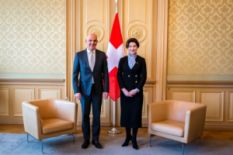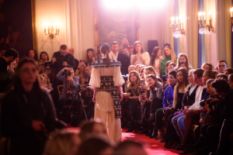Giving shelter to strangers in one's home is a very noble mission that requires a certain amount of sacrifice and openness on the part of the host. There are various cases that depend on the willingness of both parties to establish communication. According to a study conducted by the Swiss Refugee Council (SRC) in collaboration with the Lucerne University of Applied Sciences and Arts (HSLU) and the Berne University of Applied Sciences (BFH), living together with a Swiss host family generally works well or very well. More than 70% of the relationships between Ukrainian refugees and host families studied, last longer than three months, and more than half of the families have hosted refugees again at least once.
Living with host families helps Ukrainian refugees integrate into the Swiss community. Swiss families are highly motivated and provide valuable support to Ukrainians in everyday life (more than 90% of respondents), including health care, administrative issues, job search, language learning, and leisure activities. Host families receive official support, which varies from canton to canton. More than half of the refugees who leave their families move into their own apartment and become self-employed. But even after moving out, more than 50% of the host families maintain relations and connections with Ukrainians, and about a third continue to support them.
One of the Swiss families who opened their doors to a refugee from Ukraine is the Swiss artist couple Thomas Blank and his wife Nicole Kleiner. They warmly welcomed a Ukrainian woman into their family, offering her a harmonious integration into the local community, comfortable personal space and interaction. This new experience inspired the discovery of new cultural horizons - the national cuisine and culture of Ukraine. This is yet another small bridge that has brought a Swiss family and a Ukrainian refugee closer to each other.
Swiss artist Thomas Blank and his wife Nicole Kleiner have mastered the art of being happy in harmony with oneself and the world, finding one's calling, expressing oneself through creativity, and at the same time being free like birds. They inspire others to live cheerfully, dynamically and selflessly.
Thomas Blank has been working with glass for more than 25 years. Glass, he says, allows him to embody a sense of aesthetics and form because he can shape and influence the material. The Swiss glassmaker is known throughout the world and has worked in various studios.
His work has been exhibited in Europe and the United States and is part of the Honolulu Contemporary Museum collections and the Museum of Design and Applied Arts in Lausanne.
In 2020 Thomas and Nicole founded the Open Glass Studio. The two are a unique couple who create art together both in studio and in their family life: harmonious relationships, supporting and complementing each other, enjoying joint projects.
Nicole supports Thomas in his work, they share common values and live as one. They complement each other in their communication, each inspiring the other. The energetic vibration that emanates from this couple is mesmerizing.
In addition to the high art of glassmaking, Thomas has a talent for cooking – he’s a superb cook . This passion is another solid foundation for a happy married life. Last year, Thomas and Nicole's culinary horizons expanded when Ukraine, with its national cuisine and culture, entered their lives. The couple opened their home to a Ukrainian woman who had come to Switzerland because of the war. In an interview, Thomas and Nicole explain how this happened and how much it changed their lives.
The catalog of Thomas' work is fascinating. Tell us about your art project, who is it for, what is special about it?
Nicole - We are working together in our small company called Open Glass Studio: Thomas makes the glass products and I take care of the administrative work. I started my career about 30 years ago as a fashion designer, but had to take another path for personal reasons and only recently became the personal assistant to the director of the Department of Spatial Development, Infrastructure, Mobility and Environment in the canton of Fribourg. Unfortunately, I don't have time to sew much anymore, but I try to express myself in style.
The main focus for Thomas is, of course, his work as an author. He had a solo exhibition in Geneva in December 2022.
Another direction is working on commissions, which can range from the Federal Palace in Berne to private clients who need a new lampshade or glasses, for example.
Thomas - We also run workshops for anyone who is interested in learning the craft and we organize events with glass-demonstrations and sociable gatherings. We love collaborating with artists and designers, as well as other glass artisans and artists in general.
Nicole - There are not a lot of craftspeople making glass products in Switzerland. We want to increase their number and preserve this craft. After all, glass products are not only made in Murano, Italy, but also in Switzerland.
The Open Glass Studio brings together artists in Fribourg County. But I know that many people gather around your couple for another reason - you organize theme parties.
Nicole - Parties are something we always do together - from the idea to the realization. We plan a theme party well in advance and think about everything down to the last detail: bread, ice cream, biscuits, home-made cookies. I'm more in charge of Excel - I make a list and check that everything is in order. With Thomas we come up with what we want to do and then we start to realize that idea together.
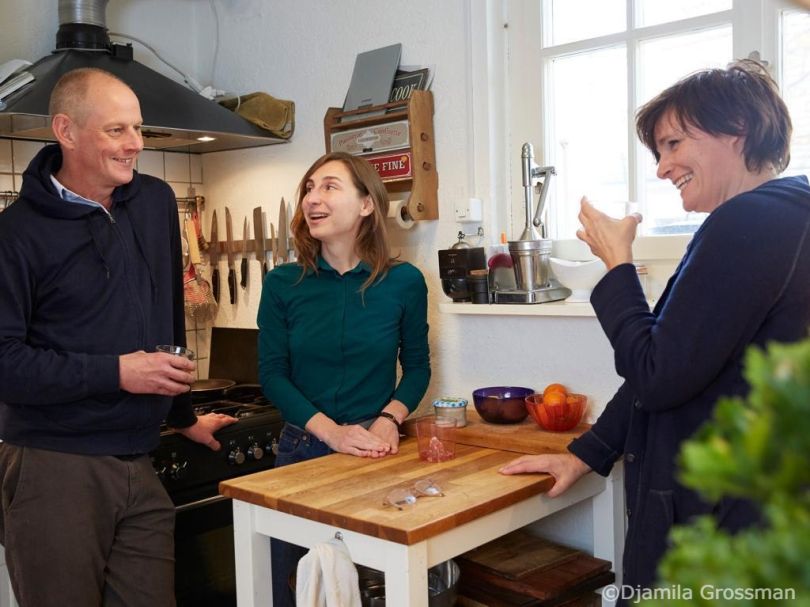
How did the idea of organizing parties come about?
Nicole - I started organizing summer parties 20 years ago. I always organized them because I’m not into birthday parties. For these summer parties, the guests usually bring something to eat according to the chosen theme, like Mexico, 70s or something, and then we cook to match. There are 20 to 40 people at the party, music depending on where we were going. Dressing up according tot he theme isn’t a must, but much more fun!
Thomas - We organize summer parties because we like to invite very open-minded people, we want to unite people from different walks of life, different nationalities and speakers of different languages. We are always happy when our friends bring their friends to diversify communication and make connections. The atmosphere at the parties is very warm and welcoming, so it's easy to make new friends.
By the way, instead of hippies, tacos, summer, love or anything else, why not have a Ukrainian party? Especially since we recently discovered Ukrainian cuisine.
"The Ukrainians I meet are very straightforward. They are polite people who give you time to get to know them. And most we have met are quite open-minded people"
How did Ukraine enter your life? What was it like to open your home to a forced refugee from a war-torn country? What motivated you to do so?
Nicole - We heard about the war when Russia attacked Ukraine from the news on TV. We were very shocked. And we decided that we should do something to help. The TV said that the Swiss Refugee Council was accepting applications from local people to take in refugees, as most of our shelters were already full.
We have a spare room with a separate bathroom at home, so we decided we could take in a person or a couple. I told a friend from my Rotary Club in Bern, who’s a professor at Bern University of Applied Sciences (BHH). Within a week, she called me and told me about an application from a young woman in the Scholars at Risk support and exchange programme at the Bern University of Applied Sciences (BFH) who needed a safe place to stay. We agreed to take her in and she arrived 10 days later.
Maryna is very "small" and the only thing you can do is take her in, give her a warm blanket, a teddy bear and make sure she's okay. In the first week after she arrived, a very cute situation happened: we have five cats and four of them wanted to sleep on her bed. Maryna had to cuddle her way into bed to have enough bed space, but the cats were so friendly.
Thomas - We are very lucky that Maryna came to us, she is so easy and pleasant to live with. But how easy it will be to live together depends on two parties - the host family and the person who arrives. The human factor always plays a major role.
Nicole - Of course, we were a little worried at first, but Maryna has integrated well into our family and society. She has an incredible network of friends and we have met some very good people who we would never have met without her. I think we are very lucky to have her here. We are not giving her back. (smiles) We have found an incredible way of interacting and she is an amazing and wonderful person. We would like her mother to come visit in order to meet her as well. Now we feel that we have a part of the family in Ukraine too, not in blood but in spirit - it's so wonderful.
"Not all Swiss families were prepared to take in refugees for more than a few months. But it is important to understand that many refugees have nowhere to go because the war has destroyed their lives, their homes, their families and their futures in Ukraine"
How are you helping Maryna to adapt and integrate quickly into Swiss society?
Thomas - I personally offer Maryna support, but I don't want to ask her every day about the news from Ukraine. I don't want to talk about the war all the time. This is my way of supporting her so that she has a sense of normality. She is here now, safe, if she wants to talk - I am here. It is more important for me to live, to be in the present. And not to stay in the past all the time, no matter how difficult it is.
Sometimes, when we watch the news together, I ask her what she thinks about certain events or situations. But I don't ask her all the time because it doesn't help her to be stronger, quite the opposite.
Nicole - I think we started to see Maryna not as a refugee or a victim almost from the beginning, but as a person who wants to do what she wants. Like parents, we want our daughter to do good, to be strong and to develop, to have a chance in life, to do what she wants. We want her to be Maryna, not a refugee, because she isn't just that. She is Maryna.
Not all Swiss families were prepared to take in refugees for more than a few months. But it is important to understand that many refugees have nowhere to go because the war has destroyed their lives, their homes, their families and their futures in Ukraine.
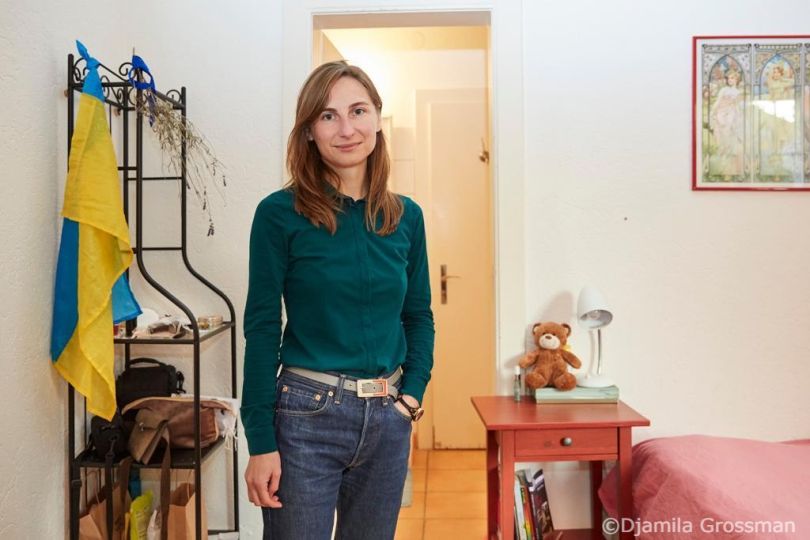
How did Maryna surprise you? What new things has she brought to your family?
Nicole - Cooking is part of world culture. So Maryna's arrival to our family certainly influenced our menu. We were very interested in trying a real Ukrainian borsch - Thomas used to cook borsch, but I think it was his European interpretation. And now Maryna cooks real borsch - the way it should be.
It's nice that she always makes a separate portion of borsch for my dad. When we go to my parents' house, she brings a small pot of borsch, which my dad eats with pleasure, he really likes it. So this is a real cultural link between our countries - Switzerland and Ukraine - thanks to this dish.
Thomas - And although eating food is important, it is even more important to share food and recipes, to be open and interested in learning other dishes, to be inspired to cook or to try dishes from other national cuisines. It is also very important to have your own recipe. Or that of Ievgen Klopotenko, the famous cook from Ukraine! His book is very inspirational and has given me lots of pleasure eating Ukrainian cuisine.
Swiss-style Ukrainian borsch is an interesting story. And have you tried any of Maryna's other dishes?
Thomas - Yes, we did. Maryna prepared other dishes - her interpretation of our cuisine was very interesting. She tried to make a Swiss quiche. At first it was edible but not very tasty, but now her quiche became very tasty because she understood both the recipe and the principles of cooking the dish. This is very unusual because she cooks it in her own way.
You have people from different cultures and mentalities living in your house. Have you and Maryna had any misunderstandings or conflicts? And how did you resolve them?
Nicole - We had only one conflict: Maryna buys store bread and I bake bread at home. And I explained to her that you just have to ask and I will bake the bread, as I don't like store-bought bread.
Thomas - Maryna and I can have a conflict when I cook - the kitchen is a mess when I’m done and she gets very upset. (smiles) No, we have never had any conflicts, we just talk, she explains the reasons for her actions and we explain our motivations. It is believed that as soon as people stop talking to each other, conflict can emerge. The human condition is communication. It is important to be honest, to be open and to be yourself. No excuses, no filters.
Nicole - And to be kind, not aggressive. Maybe something bothers you, but then it's a matter of taste, or maybe you're just not in the mood. Maybe you'll wait half an hour to cool off. And I think that is our common trait.
«We like to invite very open-minded people, we want to unite people from different walks of life, different nationalities and speakers of different languages»
What are the characteristics and human qualities of Ukrainians?
Thomas - The Ukrainians I meet are very straightforward. So far, we met about 20 Ukraininans and had the chance to communicate with them, so we formed our opinion. They are polite people who give you time to get to know them. And most we have met are open-minded people.
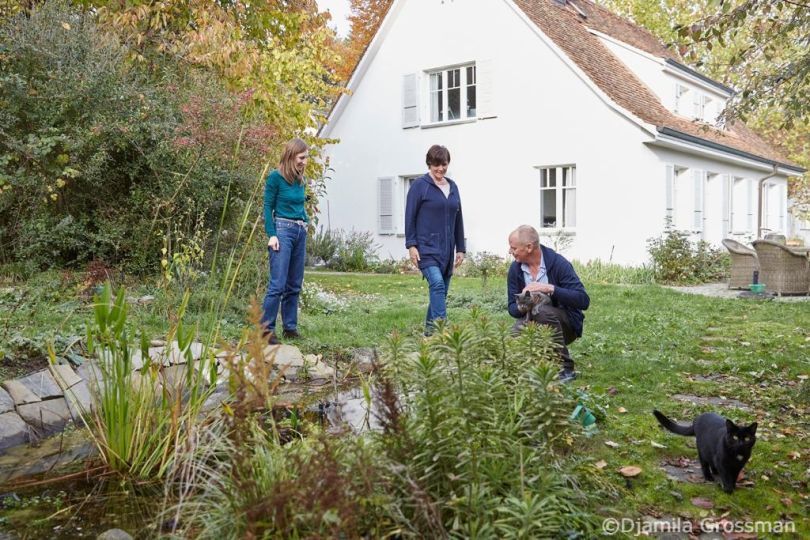
What is the key to harmonious relations in your family?
Nicole - That’s not difficult: love, connection, honesty, communication, respect, cats (smiling, ed.), humour, the ability to laugh even when the day is not very fun.
Thomas - And letting the other person be who they are, accepting them as they are and being tolerant.
Nicole - And to have a separate bedroom. Because it allows everyone to have their own space where others are just guests not invading your privacy. It can be the sofa or a room. You (Thomas) go to the studio to do something or vice versa to do nothing.
Thomas - Exactly. I think one of the main problems in relationships is that people so often destroy each other by taking on too much or expecting too much from someone or from relationships in general. And sometimes they destroy others as well.
It happens that one person has too much love and becomes a burden to another. Sometimes you come home from work and you just want to sit in silence, be alone for 30 minutes or an hour. But often people do not allow that.
Nicole - Demand too much attention. Space is important.
Thomas - Imagine a beautiful little bird that someone loves too much and never lets go. Always asking: «How are you, what are you feeling, what are we doing?» Who wants that? Nobody wants a parasite. So the best way to keep the bird is to open the cage. Then it will always come back.
Nicole - Love is giving the other the freedom and liberty to be him or herself. To never coop or imprison.
Thomas - Giving each other space is what creates a connection. And delicious food.
Nicole - Oh yes, and cooking delicious food. Important.
Thomas - Also a foot massage...
Maryna Homenyuk worked as a project and programme manager at the Kyiv-Mohyla Business School [kmbs] before moving to Switzerland.
Even a year ago, I could not have dreamed that such incredible people as Nicole and Thomas would one day appear in my life, although the circumstances are unfortunate. Their lives are filled with openness, generosity and humanity. I cherish the opportunity to live with them, to learn, contemplate, be inspired and rethink the perception of this world. I see their love and creativity in everything: in their relationships, in their professional activities, their art, cooking, baking, decorating, gardening - in every detail of their daily lives.
If someone studies in the MBA programme for professional growth, then I consider this year to be my "Life MBA".
Destinations.ua expresses sincere gratitude to Thomas Blank for providing artwork for sale at the auction dedicated to humanitarian aid to Ukrainian refugees. Funds collected from the sale will be used to purchase children's books in Ukrainian language for libraries in Switzerland.
